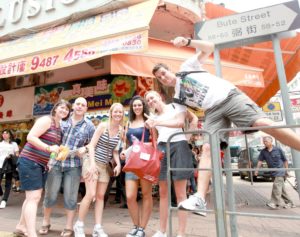Before we get into any specifics such as weekend activities and housing details, I think it’s important to get a general idea of what it’s like to live as an expat in Hong Kong. To begin with, the Hong Kong population is made up of roughly 5% expatriates. In numbers, this equates to around 360,000 expats – that’s honestly quite a bit, which means you’re never alone in any of your experiences.
GETTING AROUND

“Getting around” could mean anything from mass transport options to ease of communication. Luckily for expats in Hong Kong, that’s not usually a problem. Hong Kong has an amazing public transport system that covers pretty much every inch of the city, so you will not be stuck in a place that is completely off-the-radar in terms of transport options. Of course we have the typical – buses, taxis and MTR. They’ll take you pretty much everywhere. However, something unique to Hong Kong is the widespread use of ferries as a form of mass transport. For places in the outlying islands, or even just to get from Central to Tsim Sha Tsui, you can hop on a ferry for really cheap!
In terms of language, you can easily survive in Hong Kong with just English. All street signs, bus stops and building names have both Chinese and English on them. In terms of spoken fluency, it does vary from place to place, but for most urban areas; you will be completely fine.
MEETING EXPATS
Hong Kong is not lacking an expat community; it’s really just up to you to connect with them. There are numerous Facebook groups such as “Hong Kong Expats” that allow people to meet online and share information. There are also official platforms such as “InterNations” that host events for expats to meet each other. To be honest, even just going out for some dinner after work with your fellow coworkers will be enough to expand your social circle quickly, as many other expats will likely be there too.
If you come teach at ESF, we host three major events during the first month of your arrival to help you meet other incoming teachers. The three vary in levels of formality, and allow you to meet your fellow coworkers in different environments.

Induction – mostly information about Hong Kong and mingling
Treasure Hunt – a day of racing through Hong Kong in groups
Cocktail Reception – a fancy dinner with lots of chit-chat
We hope that by the end of these three get-togethers, you can make some good friends to explore the city with.
COST OF LIVING
The cost of living in Hong Kong is mostly subjective. In terms of shopping and groceries, Hong Kong is honestly quite inexpensive, especially if you go to more local areas that are not specifically geared towards the expat community. Transport is relatively cheap (if you don’t drive. Driving your own car is very expensive.) Eating out is also surprisingly cheap – once again, depending on which restaurant you choose to dine in. But there are definitely many cheaper options for food; you just have to bother to look for them.
However, housing is expensive and there is absolutely no denying that. Definitely prepare yourself for that before you decide to come to Hong Kong. (Note: ESF does provide all expat teachers with a housing allowance ? ) Spend some time researching different areas. We will also publish a blog post specifically for that. ?
THINGS TO DO
An expat professor at HKUST actually wrote a list of 1000 things to do in Hong Kong. He is adamant that there is absolutely no way to be bored in Hong Kong, and we couldn’t agree more. There is just SO MUCH to do. So much that we’ll have to break it up into a few different blog posts. To give you a quick idea:
Hiking, going to the beach, shopping, taking scenic photos, eating street food, exploring outlying islands, visiting the park, biking, ice skating, watching 4D movies, playing sports, going to the arcade, strawberry picking, water sports, barbecuing, watching street performers, taking a day trip to Macau, taking a tram ride…
YOU WILL NOT BE BORED. EVER.
Hong Kong is a wonderful place for expats, and many think it’s because it has such a good mix of culture. You get to experience true Asian culture, but at the same time don’t feel too foreign. It’s like being able to dip your toes into the international experience, and is a great starting point for anyone who wants to travel around the world while working. It also helps if your company supports you through the entire process ?
